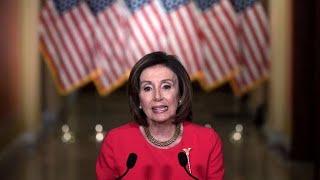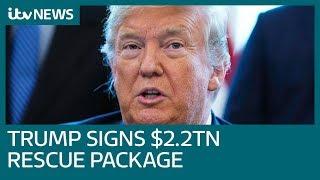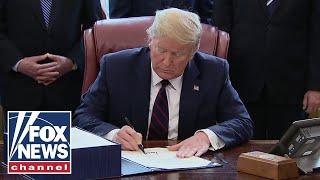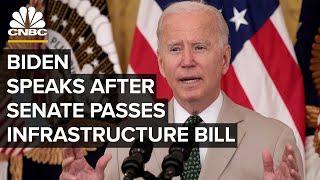Coronavirus: What's in the Senate's $2 trillion COVID-19 rescue plan
Description
The Senate passed its coronavirus relief bill late Wednesday night. The legislation will now go to the House of Representatives for consideration. CNBC's Eamon Javers reports the details of the bill and the negotiations.
The unprecedented stimulus bill approved unanimously by the Senate has an estimated $2 trillion price tag that backers hope will lessen the coronavirus pandemic’s human and economic toll.
The chamber passed the legislation Wednesday night as workers face widespread layoffs, hospitals and states starve for resources and businesses small and large worry about their survival. The House aims to pass it by Friday.
The bill, designed to offer relief to individuals, the health-care system and even an entire corporate sector ravaged by the outbreak, would:
Give one-time direct payments of up to $1,200 for individuals and $2,400 for couples, with $500 added for every child, based on 2019 tax returns for those who filed them and 2018 information if they have not. The benefit would start to phase out above $75,000 in income for individuals and $150,000 for couples, going away completely at the $99,000 and $198,000 thresholds, respectively.
Boost unemployment insurance, adding $600 per week for up to four months on top of what beneficiaries normally receive from states. It expands eligibility to self-employed people and independent contractors.
Create a $500 billion pool of taxpayer money to make loans, loan guarantees or investments to or in businesses, states and municipalities damaged by the crisis.
Give $25 billion in grants to airlines and $4 billion to cargo carriers to be used exclusively to pay employee wages, salaries and benefits, and set aside another $25 billion and $4 billion, respectively, for loans and loan guarantees.
Provide $17 billion in loans and loan guarantees for unspecified “businesses critical to maintaining national security.”
Put $117 billion into hospitals and veterans’ health care.
Provide $16 billion for the strategic national stockpile of pharmaceutical and medical supplies.
Give $350 billion in loans for small businesses to cover salary, wages and benefits, worth 250% of an employer’s monthly payroll, with a maximum loan of $10 million.
Include a tax credit for retaining employees, worth up to 50% of wages paid during the crisis, for businesses forced to suspend operations or that have seen gross receipts fall by 50% from the previous year.
Require group health plans and insurance providers to cover preventive services related to coronavirus without cost sharing.
Delay payroll tax for employers, requiring half of the deferred tax to be paid by the end of 2021 and the other half by the end of 2022.
Ban companies that take government loans from buying back stock until a year after the loan is paid back.
Bar employees or executives who made at least $425,000 last year from getting a raise.
Stop President Donald Trump and his family members’ businesses from receiving emergency taxpayer relief. The provision also applies to Vice President Mike Pence, heads of executive departments, members of Congress and their family members.
Suspend federal student loan payments through Sept. 30 with no accrual of interest on those loans.
For more coronavirus live updates:
https://www.cnbc.com/2020/03/25/coronavirus-latest-updates.html
For access to live and exclusive video from CNBC subscribe to CNBC PRO: https://www.cnbc.com/pro/?__source=youtube%7CDEK
» Subscribe to CNBC TV: https://cnb.cx/SubscribeCNBCtelevision
» Subscribe to CNBC: https://cnb.cx/SubscribeCNBC
» Subscribe to CNBC Classic: https://cnb.cx/SubscribeCNBCclassic
Turn to CNBC TV for the latest stock market news and analysis. From market futures to live price updates CNBC is the leader in business news worldwide.
Connect with CNBC News Online
Get the latest news: http://www.cnbc.com/
Follow CNBC on LinkedIn: https://cnb.cx/LinkedInCNBC
Follow CNBC News on Facebook: https://cnb.cx/LikeCNBC
Follow CNBC News on Twitter: https://cnb.cx/FollowCNBC
Follow CNBC News on Instagram: https://cnb.cx/InstagramCNBC
#CNBC
#CNBC TV





















Comments